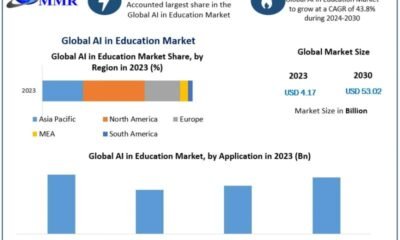AI Research
Edge Artificial Intelligence (AI) Processor Market Poised

The Edge AI Processor Market is undergoing a transformative shift as smart technologies continue to proliferate across industries. In 2025, the market size stood at US$ 3,677.1 million, and it is projected to surpass US$ 8,597.3 million by 2032, growing at a CAGR of 12.9% during the forecast period (2025-2032). According to Persistence Market Research (PMR), the market is driven by the need for real-time data processing in edge devices and the growing demand for enhanced data privacy, lower latency, and reduced reliance on cloud infrastructure.
Among the segments, consumer devices lead the market due to widespread adoption of smartphones and IoT gadgets. North America is the leading geographical region, expected to reach US$ 3.9 billion by 2032. This dominance is primarily due to a surge in the number of IoT-connected devices and heavy investment in AI infrastructure, particularly in the United States. Edge AI’s promise of real-time analytics without needing cloud connectivity is pushing its use across homes, vehicles, factories, and healthcare systems.
✅Get a Sample Copy of Research Report (Use Corporate Mail id for Quick Response): https://www.persistencemarketresearch.com/samples/33385
✅Key Highlights from the Report:
➤ The market is set to grow from US$ 3,677.1 million in 2025 to US$ 8,597.3 million by 2032.
➤ Consumer devices are expected to dominate with a CAGR of 12.4% during the forecast period.
➤ North America is forecasted to be the largest regional market by 2032.
➤ The CPU-based Edge AI processor segment is projected to maintain the highest traction.
➤ Real-time data processing and reduced latency are major adoption drivers.
➤ Automotive and healthcare sectors are emerging as high-growth end-use industries.
Market Segmentation: Breaking Down the Edge AI Processor Ecosystem
Edge AI processor market segmentation helps identify core growth pockets across various categories. By processor type, the market includes Central Processing Units (CPUs), Graphics Processing Units (GPUs), and Application-Specific Integrated Circuits (ASICs). Among these, CPUs remain the most sought-after segment due to their versatility and compatibility with a wide range of applications. As CPUs are cost-effective and energy-efficient, they are widely preferred for mobile and IoT applications, a trend emphasized by Persistence Market Research.
From a device type perspective, consumer devices dominate the market. The sheer volume of smartphones-projected to surpass 1.5 billion units by 2028-demonstrates how deeply integrated Edge AI processors are becoming in daily life. These processors power voice assistants, facial recognition, and personalization features directly on devices, thereby enhancing user experience while maintaining data privacy by reducing dependence on cloud services.
✅Regional Insights
The United States remains at the forefront of the edge AI processor revolution. With an expected CAGR of 11.4% from 2025 to 2032 and projected market size of US$ 3.1 billion, the U.S. growth is attributed to increased smartphone penetration and investment in AI-based innovations. Edge AI processors are being integrated into smart home systems, healthcare diagnostics, and autonomous driving technologies.
In the United Kingdom, the market is projected to reach US$ 478.0 million by 2032, driven by high smartphone adoption and advancements in 5G technology. Meanwhile, China is positioning itself as a global manufacturing hub for edge AI processors. The market in China is forecasted to be worth US$ 813.3 million by 2032, supported by the country’s massive production of smartphones and smart vehicles, and robust government initiatives to lead AI innovation.
✅Market Drivers
One of the primary drivers for the edge AI processor market is the exponential growth in IoT-connected devices. Expected to reach 75 billion devices by 2025, IoT is transforming industries like healthcare, automotive, and smart homes, all of which require instant data processing. Edge AI enables this by processing information directly on the device, reducing latency and increasing efficiency.
Another strong market driver is the rise of Industry 4.0. From predictive maintenance in factories to automated systems in logistics and retail, edge AI processors are becoming indispensable. The growing demand for real-time decision-making, coupled with stricter data privacy regulations, has made edge processing a practical and secure solution for businesses.
Finally, the integration of Edge AI in autonomous vehicles represents a transformative force. Autonomous driving requires millisecond-level decisions which are not feasible with cloud latency. Edge AI processors allow vehicles to make fast, independent judgments, enhancing safety and performance.
✅Market Restraints
Despite its strong growth trajectory, the market faces several restraints. One key challenge is the complexity of designing efficient edge AI chips that balance power consumption with computational speed. These chips need to function efficiently without access to the massive resources of cloud servers.
High upfront development costs and limited compatibility across diverse hardware ecosystems can also slow down adoption. Companies must invest in specialized talent and equipment to build edge AI systems, creating entry barriers for smaller players.
Furthermore, security concerns still exist. While edge AI offers better privacy than cloud-based models, securing data locally on devices from tampering or unauthorized access is a continuing challenge for manufacturers and users alike.
✅Request for Customization of the Research Report: https://www.persistencemarketresearch.com/request-customization/33385
✅Market Opportunities
Emerging opportunities for the edge AI processor market are numerous and far-reaching. The rapid expansion of smart cities is a fertile ground for innovation. Smart traffic systems, public safety networks, and energy management infrastructure require real-time data analytics, an area where edge AI excels.
Healthcare is another domain poised for disruption. From wearables that monitor vitals to diagnostic devices using AI for disease detection, edge processors can provide faster and more secure healthcare solutions. The market is set to grow as demand for remote patient monitoring and telemedicine increases globally.
Additionally, edge AI’s role in retail and e-commerce is expanding. Applications like cashier-less stores, smart shelves, and customer behavior tracking rely on localized decision-making. This opens doors for edge AI processor manufacturers to collaborate with global retail giants for next-gen retail solutions.
✅Reasons to Buy the Report:
✔ Gain in-depth insight into the global edge AI processor market dynamics and future trends.
✔ Evaluate market segments and opportunities across processor types and end-user industries.
✔ Understand regional dynamics and identify the most promising geographies for investment.
✔ Leverage competitor analysis and recent developments for strategic decision-making.
✔ Access actionable insights backed by industry-leading research from Persistence Market Research.
Company Insights
✦ Qualcomm Technologies Inc.
✦ Mythic
✦ Arm Limited
✦ HiSilicon Technologies Co Ltd
✦ Intel Corporation
✦ Advanced Micro Devices, Inc. (AMD)
✦ Rohm Semiconductors
✦ Hyundai Motor Group
✦ Alphabet Inc.
✦ Apple Inc.
✦ Samsung Electronics Co., Ltd.
✦ Nvidia Corporation
Recent Developments:
✦ In November 2022, Rohm Semiconductors unveiled an AI chip for edge computing with ultra-low power, capable of real-time failure detection in IoT devices.
✦ In January 2020, Apple Inc. acquired Xnor.ai, enabling AI functionalities to operate directly on devices like smartphones and cameras, reinforcing its edge computing capabilities.
Conclusion
The Edge AI Processor Market is poised to redefine the future of AI-powered applications by bringing computation closer to the data source. As industries transition towards smarter and more autonomous systems, the need for low-latency, energy-efficient, and secure processing becomes critical. With robust growth predicted across regions and segments, particularly in consumer devices and automotive applications, stakeholders across the ecosystem-from chip manufacturers to application developers-stand to benefit immensely.
Persistence Market Research reinforces the forecast with evidence-based insights, painting a future where Edge AI processors are central to innovation. From transforming urban infrastructure to enabling intelligent healthcare and personalized retail experiences, the potential of this market is vast and multifaceted. As companies navigate the technological, financial, and strategic landscapes, those who invest early and innovate consistently will lead the charge in shaping the intelligent edge.
Contact Us:
Persistence Market Research
G04 Golden Mile House, Clayponds Lane
Brentford, London, TW8 0GU UK
USA Phone: +1 646-878-6329
UK Phone: +44 203-837-5656
Email: sales@persistencemarketresearch.com
Web: https://www.persistencemarketresearch.com
About Persistence Market Research:
At Persistence Market Research, we specialize in creating research studies that serve as strategic tools for driving business growth. Established as a proprietary firm in 2012, we have evolved into a registered company in England and Wales in 2023 under the name Persistence Research & Consultancy Services Ltd. With a solid foundation, we have completed over 3600 custom and syndicate market research projects, and delivered more than 2700 projects for other leading market research companies’ clients.
Our approach combines traditional market research methods with modern tools to offer comprehensive research solutions. With a decade of experience, we pride ourselves on deriving actionable insights from data to help businesses stay ahead of the competition. Our client base spans multinational corporations, leading consulting firms, investment funds, and government departments. A significant portion of our sales comes from repeat clients, a testament to the value and trust we’ve built over the years.
This release was published on openPR.
AI Research
Back to School – With Help From AI – Terms of Service with Clare Duffy

Kirk suspect reportedly confesses, Tesla stock, ‘tooth-in-eye’ surgery & more
5 Things
Listen to
CNN 5 Things
Mon, Sep 15
podcast
New technologies like artificial intelligence, facial recognition and social media algorithms are changing our world so fast that it can be hard to keep up. This cutting-edge tech often inspires overblown hype — and fear. That’s where we come in. Each week, CNN Tech Writer Clare Duffy will break down how these technologies work and what they’ll mean for your life in terms that don’t require an engineering degree to understand. And we’ll empower you to start experimenting with these tools, without getting played by them.
Back to School – With Help From AI Terms of Service with Clare Duffy Sep 16, 2025
Kids are heading back to school. One thing students, teachers and parents can expect to encounter this year is artificial intelligence, which has raised all kinds of questions, both positive and negative. So, how can you make sure your student is navigating AI safely and successfully? Dr. Kathleen Torregrossa has been an educator for 37 years in Cranston, Rhode Island. She explains how teachers are using AI in the classroom, and what families need to know about its impact on learning. – This episode includes a reference to suicide. Help is available if you or someone you know is struggling with suicidal thoughts or mental health matters. In the US: Call or text 988, the Suicide & Crisis Lifeline. Globally: The International Association for Suicide Prevention and Befrienders Worldwide have contact information for crisis centers.
AI Research
Lewis Honors College introduces ‘Ideas that Matter’ program series

LEXINGTON, Ky. (Sept. 16, 2025) — This fall, the Lewis Honors College (LHC) launches its “Ideas that Matter” series, a program connecting students with leading scholars, innovators and changemakers on issues shaping today’s world — from free speech and artificial intelligence to nonprofit innovation.
LHC Director of College Life Libby Hannon, who initiated the series, said the goal is to spark lively dialogue.
“The ‘Ideas that Matter’ discussions combine intellectually engaging questions with interactive conversations and allow our students to speak with some of the most forward-thinking scholars, changemakers and entrepreneurs from Lexington and beyond,” Hannon said.
The series begins Sept. 18 with University Research Professor Neal Hutchens, Ph.D., who will explore the historical and legal background of free speech and academic freedom in campus life. His talk, 5-6 p.m. in the Lewis Scholars Lounge, will conclude with an interactive Q&A.
“I’m especially looking forward to the conversation part of the evening, where we engage in and model the kind of vibrant back-and-forth that is crucial to maintaining systems of free speech and academic freedom,” Hutchens said.
On Oct. 6, Lewis Lecturer Sherelle Roberts, Ph.D., will moderate a panel of experts on artificial intelligence as they discuss “The Future of Earth and AI,” including the current and potential impacts of artificial intelligence on the future of work, the economy and the environment.
“Artificial Intelligence is quickly becoming a part of our everyday lives. Some even believe AI will transform our world as dramatically as the Industrial Revolution,” Roberts said. “This event will get our students thinking critically about our possible AI-driven future, while also having some fun.”
The event will begin at 5:30 p.m. with movie snacks and will transition into the panel discussion at 6 p.m., featuring faculty and staff from a variety of disciplines. The movie, an animated film that conceptualizes our AI-powered future, will begin at 7 p.m.
The final event of the semester on Nov. 11, will spotlight local nonprofit Operation Secret Santa (OSS), 5-6 p.m. in the Lewis Scholars Lounge. Founder Katie Keys and honors program alum Lucy Jett Waterbury will share the story of OSS’s creation in 2016 and its growing impact on the community.
“Operation Secret Santa is built on the belief that no child should face barriers to feeling loved and celebrated,” said Keys. “We meet families where they are, right at their doorsteps, bringing not only gifts and food, but the reminder that their village sees them and cares.”
“From (Katie’s) big heart, she has built a big, yet lean and efficient, nonprofit that has one very simple goal, to bring joy to Kentucky kids at Christmas time,” Waterbury said.
Through this series, LHC offers students a chance to engage with pressing issues, broaden their perspectives and learn directly from those making a difference.
AI Research
Ethereum Foundation Bets Big on AI Agents with New Research Team

TLDR
- Ethereum Foundation launches new dAI Team led by research scientist Davide Crapis to connect blockchain and AI economies
- Team focuses on enabling AI agents to make payments and coordinate without intermediaries on Ethereum
- Group continues work on ERC-8004 standard for proving AI agent identity and trust
- Initiative aims to make Ethereum the settlement layer for autonomous machine transactions
- Foundation hiring AI researcher and project manager to staff the new specialized unit
The Ethereum Foundation has formed a specialized artificial intelligence research team to position Ethereum as the foundation for autonomous machine transactions. Research scientist Davide Crapis announced the new dAI Team on Monday, outlining plans to merge blockchain technology with AI systems.
The team will pursue two main goals according to Crapis. First, enabling AI agents to conduct payments and coordinate activities without human intermediaries. Second, building a decentralized AI infrastructure that reduces dependence on major technology companies.
We’re starting a new AI Team at the Ethereum Foundation (the dAI Team).
Our mission: make Ethereum the preferred settlement and coordination layer for AIs and the machine economy.The team will focus on two main areas:
– AI Economy on Ethereum = giving AI agents and robots ways… pic.twitter.com/9sWVS4dp0K— Davide Crapis (@DavideCrapis) September 15, 2025
Crapis leads the new unit and will connect its work with the Foundation’s protocol development group and ecosystem support division. The team has begun hiring for an AI researcher position and a project manager role to drive coordination efforts.
The dAI Team builds on existing work around ERC-8004, a proposed Ethereum standard co-authored by Crapis. This standard aims to establish identity and reputation systems for autonomous AI agents. The protocol would allow these agents to prove their trustworthiness and coordinate activities without centralized oversight.
AI Agent Infrastructure Development
The Ethereum Foundation sees growing demand for settlement systems as AI agents begin conducting more transactions. Crapis stated that intelligent agents need neutral infrastructure for handling value transfers and reputation management. Ethereum’s censorship resistance and verifiability make it suitable for these functions.
Current blockchain activity supports this vision of expanded use cases. CryptoQuant data shows Ethereum processed 12 million daily smart contract calls on Thursday. The analytics firm noted that network activity remains in expansion mode with record transaction volumes and active addresses.
AI agents operate as programs that make decisions with minimal human supervision. They can execute transactions and perform tasks on behalf of their programmers. Blockchains with programmable features like smart contracts provide suitable environments for these autonomous systems.
The Foundation restructured in 2025 to handle Ethereum’s growth through specialized units. The dAI Team represents part of this shift toward addressing emerging technologies. Previous focus areas included layer-2 scaling solutions and zero-knowledge proof development.
Decentralized AI Stack Goals
Multiple blockchain projects are working to integrate AI and distributed ledger technology. Matchain launched a decentralized AI blockchain in 2024. KiteAI announced an AI-driven blockchain in the Avalanche ecosystem in February 2025.
The Ethereum Foundation’s approach differs by focusing on standards and infrastructure rather than creating new blockchains. The dAI Team will support public goods and projects that combine AI with existing Ethereum capabilities.
Crapis emphasized the mutual benefits of linking AI and Ethereum. He stated that Ethereum makes AI more trustworthy while AI makes Ethereum more useful. This relationship could expand as more autonomous agents require blockchain services.
The team operates under Ethereum’s decentralized acceleration philosophy. This approach prioritizes open and verifiable AI development while maintaining human oversight of intelligent systems. The Foundation aims to prevent AI infrastructure lock-in by major technology companies.
Industry experts see potential for AI agents and blockchain technology to reshape digital commerce. The combination could enable new forms of autonomous economic activity without traditional intermediaries.
The Ethereum Foundation has begun publishing resources for the new team according to Crapis. He stated the Foundation will work with urgency to connect AI developers with the Ethereum ecosystem and accelerate research between the two fields.
-

 Business3 weeks ago
Business3 weeks agoThe Guardian view on Trump and the Fed: independence is no substitute for accountability | Editorial
-
Tools & Platforms1 month ago
Building Trust in Military AI Starts with Opening the Black Box – War on the Rocks
-

 Ethics & Policy2 months ago
Ethics & Policy2 months agoSDAIA Supports Saudi Arabia’s Leadership in Shaping Global AI Ethics, Policy, and Research – وكالة الأنباء السعودية
-

 Events & Conferences4 months ago
Events & Conferences4 months agoJourney to 1000 models: Scaling Instagram’s recommendation system
-

 Jobs & Careers3 months ago
Jobs & Careers3 months agoMumbai-based Perplexity Alternative Has 60k+ Users Without Funding
-

 Podcasts & Talks2 months ago
Podcasts & Talks2 months agoHappy 4th of July! 🎆 Made with Veo 3 in Gemini
-

 Education3 months ago
Education3 months agoVEX Robotics launches AI-powered classroom robotics system
-

 Education2 months ago
Education2 months agoMacron says UK and France have duty to tackle illegal migration ‘with humanity, solidarity and firmness’ – UK politics live | Politics
-

 Podcasts & Talks2 months ago
Podcasts & Talks2 months agoOpenAI 🤝 @teamganassi
-

 Funding & Business3 months ago
Funding & Business3 months agoKayak and Expedia race to build AI travel agents that turn social posts into itineraries















